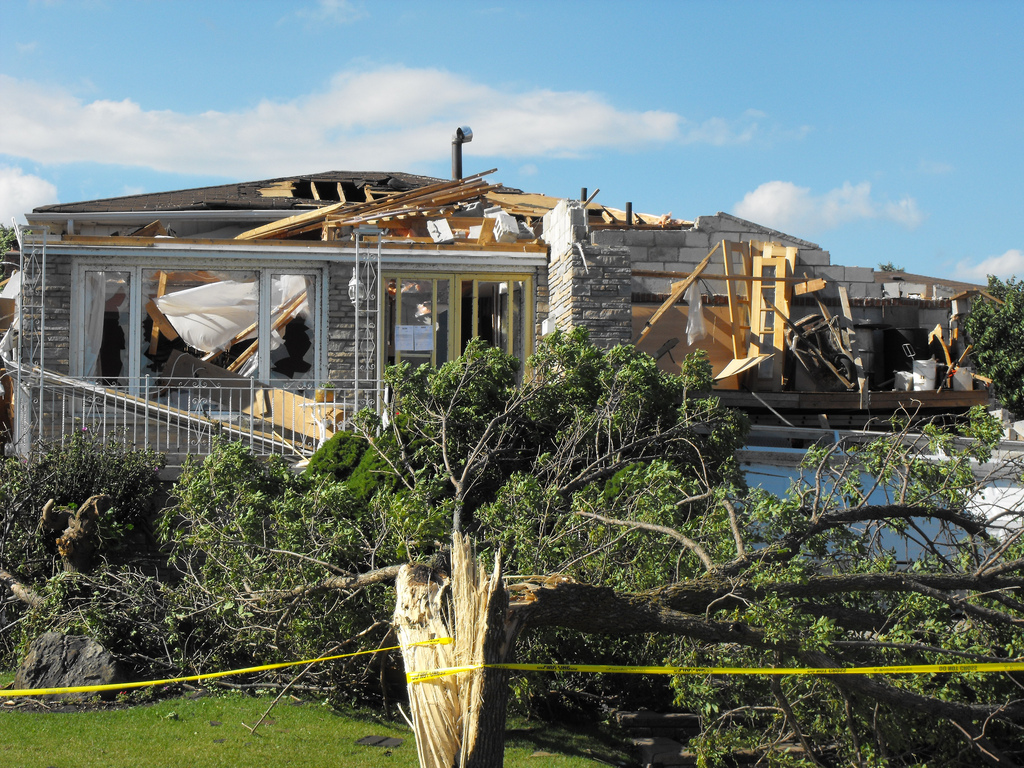It was the middle of the night on May 13, 2000, and Shannon Carroll-Wiedener, eight months pregnant, was lying in bed. She could hear the rain outside, but it was only something in the background. She never gave it a second thought.

Instead, her mind was swirling. Unable to sleep, she decided to get up and go to the basement to look for some paperwork she’d been mulling over. But as she walked across the basement carpet, she realized something wasn’t right. In the carpet behind her she could see the imprint of her feet. She lifted up a square of the carpet and suddenly water began to rise.
“The water was coming up from the floor drain,” she recalled. She ran upstairs to wake her sleeping husband. “By the time we got downstairs, it was up to our ankles.” And, she added, “It was raining like crazy.”
Carroll-Wiedener recalls the creek behind her house had risen to levels she’d never seen before. “It was scary high,” she said.
In June 2012, the Insurance Bureau of Canada (IBC) commissioned the report “Telling the Weather Story,” prepared by The Institute for Catastrophic Loss Reduction (ICLR). That report used findings from the International Panel on Climate Change (IPCC) as well as information from Environment Canada. It concluded that severe weather is on the rise in Canada and worldwide and believes that the rise in global temperature is to blame.
“In Canada, on average, temperatures warmed by more than 1.3°C between 1948 and 2007, a rate of warming that was about twice the global average,” the report states.
- Ontario First Nation declares state of emergency amid skyrocketing benzene levels
- Singh mulls TikTok return as U.S. nears potential ban over security fears
- More financial institutes are offering crypto-services, survey shows
- Possible TikTok ban in U.S. looms after Biden signs bill, setting up legal fight
“The earth is projected to warm by another 1.5 °C by 2050,” it continues. “This change in the climate is expected to have varying impacts on temperature, precipitation and extreme weather trends throughout Canada, depending on the region of the country and the season.”
This means that Canadians can expect more severe weather events like the flooding Carrol-Wiedener experienced; there will be more wind events, more tornadoes, more hail storms and more snow.
Pete Karageorgos, Manager of Consumer and Industry Relations (Ontario) for IBC, recalled that the perception of weather has changed across Canada.
“Anecdotally,” he said, “I’ve been in the insurance industry for 20 years. One of my earliest jobs was doing PR work in the insurance industry…I recall doing media events, and without fail, almost everyone would say, ‘We don’t get tornadoes here,’ despite the tornado we got in Barrie.
“But now, as a group, we’re seeing more and more weather events impacting us.”
In 2011, extreme weather events cost insurers most of the $1.6 billion in “catastrophic events” that occurred across the country.
In May, the IBC issued a press release stating that Alberta leads the country in extreme weather losses in recent years.
“Extreme weather is on the rise across Canada,” IBC said in a press release. “Of all the catastrophic insured-losses that took place in Canada last year, 62% were in Alberta.”
In Ontario, a recent study found that about 64% of people believe that the severe weather is increasing and becoming more frequent. Of those people, only half have taken extra precautions to protect their homes against such weather.
The IBC is working with municipalities to ensure that the infrastructure is in place for sewers.
“Underground infrastructure doesn’t get as much attention as roads and sidewalks,” said Karageorgos.
But there are steps that Canadians can take in order to protect against making insurance claims.
Alex Walker, Claims Director at the insurance company RSA, said that there are a lot of things Canadians can do to minimize damage or danger to their homes or themselves during severe weather.
“I think more people are aware of the weather,” Walker said. “Especially recently. Storms are becoming more frequent and more severe.”
Walker suggests that homeowners get in the habit of checking their property on a regular basis. The best thing is to look at the exterior walls of your home and check the foundation and the roof.
“Make sure that you don’t have any missing shingles or that the flashing on the side of the house, like where the roof butts up against a wall, isn’t coming loose…That way if there’s a wind storm, you don’t have to worry about water penetrating into your residence and causing damage.”
“If you do have a property with a lot of trees or shrubs or bushes on it, you want to make sure that it’s well-maintained and that the branches and trees are pruned… We certainly see when there are wind storms and there are heavy rains that… quite often tree limbs fall on cars and driveways and houses and heaven forbid on people.”
Karageorgos added, “People should look at grading around their homes to make sure that water is going away from their homes.”
The IBC also looked at promoting water barrels. The barrels would collect rain around a home. This would prevent it from seeping into the ground causing sewers to back up.
In the past, homeowners were advised to protect their homes against fire damage. Now, Karageorgos said, “Water is the new fire.”
It’s also important that if people have finished their basements that they advise their insurers. If they don’t, they could face huge damage bills that they will have to cover themselves.
Since the flood, Carrol-Wiedener and her family have taken steps to ensure that, should another flood happen, the damage will be minimal: they purchased a sump pump, installed tile instead of carpet, and put their washer and dryer up on blocks.
“It’s paid for itself a million times,” Carrol-Wiedener says of the sump pump.
Of the chance of another serious flood affecting her, Carroll-Wiedener added, “Now I’m paranoid.”



Comments